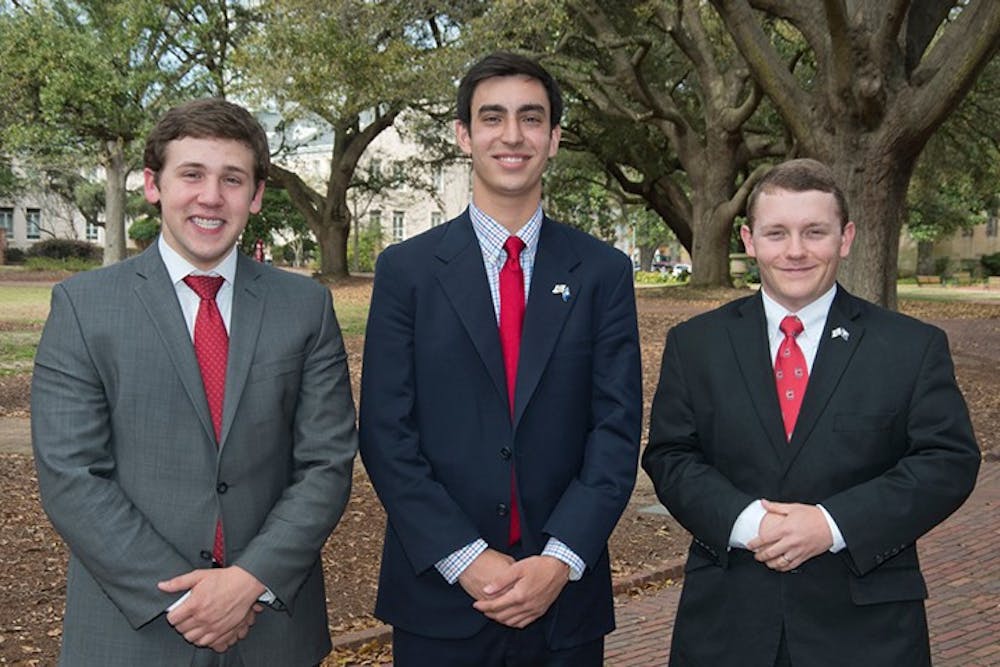For Student Government, this year’s overarching goal is a familiar one — improving the way the university and students interact with each other.
The heads of the SG’s executive, judicial and legislative branches plan to improve how students connect with the organizations' various offices, the university itself and each other.
For Jonathan Kaufman, Student Body President and fourth-year political science student, clearer interaction between the two parties has always been his aim.
When asked what he wanted to improve most on campus before he was elected, his answer was immediate.
“Communication. I’ve looked at great schools across the country and we compare well in terms of what’s offered,” he said. “I think a big difference is that a lot of our students don’t know about them, or take advantage of them. Anything I can do to bridge that gap is my main goal.”
As de-facto head of SG’s executive branch, Kaufman’s view of SG’s central mission lines up with the leaders of the legislative and judicial branches, third-year English student Lee Goble and fourth-year business economics student Ross Abbott, respectively.
Abbott, Chief Justice of the Constitutional Council, is in charge of SG’s primary judicial body — in his words the “Supreme Court of Student Government.” They primarily weigh cases brought by individuals against Student Government or student organizations and, after deliberation, issue impartial judgments.
“We don’t get all that many cases a year. Maybe one or two in a busy year,” Abbott said. “And while I like to think that means that SG is doing all of its jobs properly and that all the student organizations are doing their jobs properly ... I certainly don’t want there to be a low number because people feel it’s imposing to be able to assert their rights.”
Goble, too, feels that there is a disconnect between many students and the services that SG offers.
“One of the big things I campaigned on — one thing I really want to do — is advertising what we offer as Student Government,” Goble said. “Many people don’t know about Carolina Cab in Five Points. It’s there. It’s probably the best safe-ride program going on in this area. So, I’d like for us to advertise that a little bit more.”
The leader of each branch — executive, legislative and judicial — recognizes the problem, and each has a solution to address the disconnect.
For Abbott, connecting to students means more clearly explaining what Constitutional Council does, and what it can offer students. They plan on releasing easy-to-read pamphlets that clearly outline how to plead a case, defend oneself against a case or understand how to use procedure.
“There’s a lot of legal jargon in our governing documents,” he said. “What we’re working on is translating that jargon and making it simple to the everyday student so they can come in and say ‘I have a complaint about my organization, how can I change that?’”
In Goble's estimation, improving communication means changing the way SG members talk to the student body in everyday communication.
“I don’t think we need to spend lots of money to do it. We just need to make sure that our members are informed, so they can give that information to the rest of the students,” Goble said. “They were elected; they have networking skills. And they should use those skills to inform all of their constituents as to what’s going on.”
For Kaufman, the answer lies in a university-wide mobile app that would consolidate and present university-related information in a clear format.
“The university-wide app is not an original idea,” he said. “There are university apps at almost every single other SEC school, all of our peer schools, all of our aspirant schools. And from what I’ve heard, a lot of students use the apps at those respective institutions. And the reason why is it connects them to their university.”
While still in the early planning stages, the app could include: a campus directory, course catalogue, event calendar, portals to local news and other relevant sources of information.
The proposed app, which is still in the conceptual phase, has no solid release date. If all goes well, Kaufman said, the app would be ready at the end of his college career — sometime around May 2016.
Part of the reason for this uncertainty is finding someone to produce the app. Even a working demonstration of the product is a long way off.
But another factor is Kaufman himself. “It’s also going to come down to how hard I can work this year. And I will do my absolute best to make this as quick as possible,” he said. “There’s a phrase I like to say: be quick, don’t hurry. If we can be quick and we can do it when I’m here — great. But if it’s going to be hurried to get it out when I'm here, then we're going to wait. I want to do it right, rather than rushed.”

